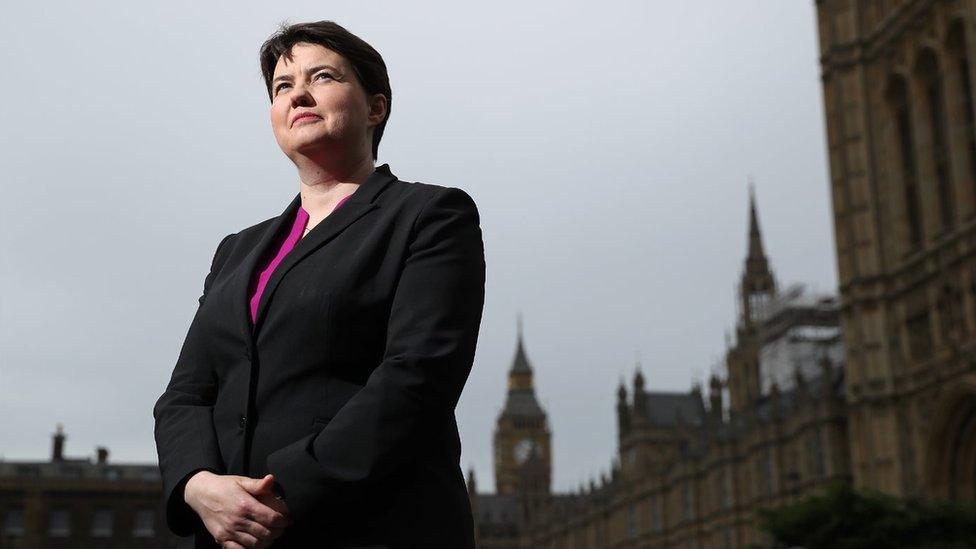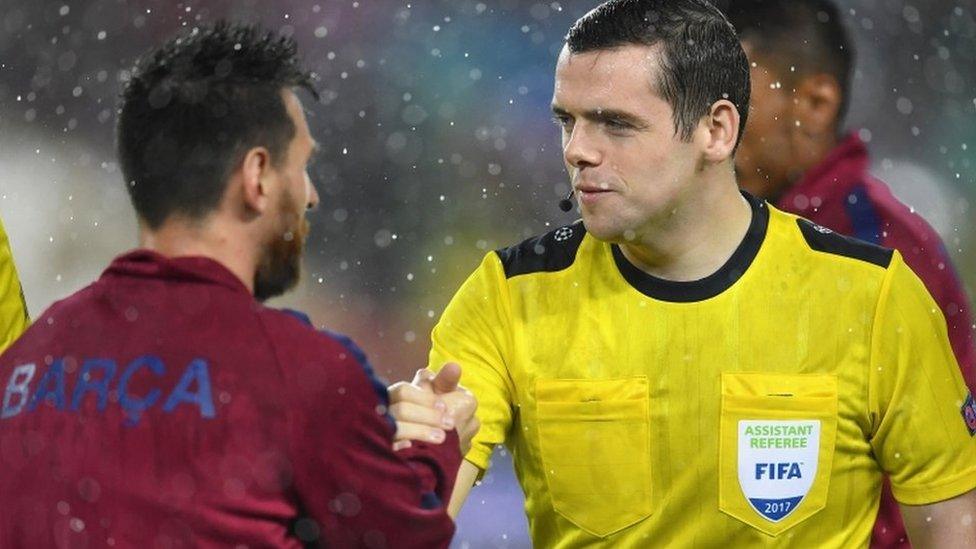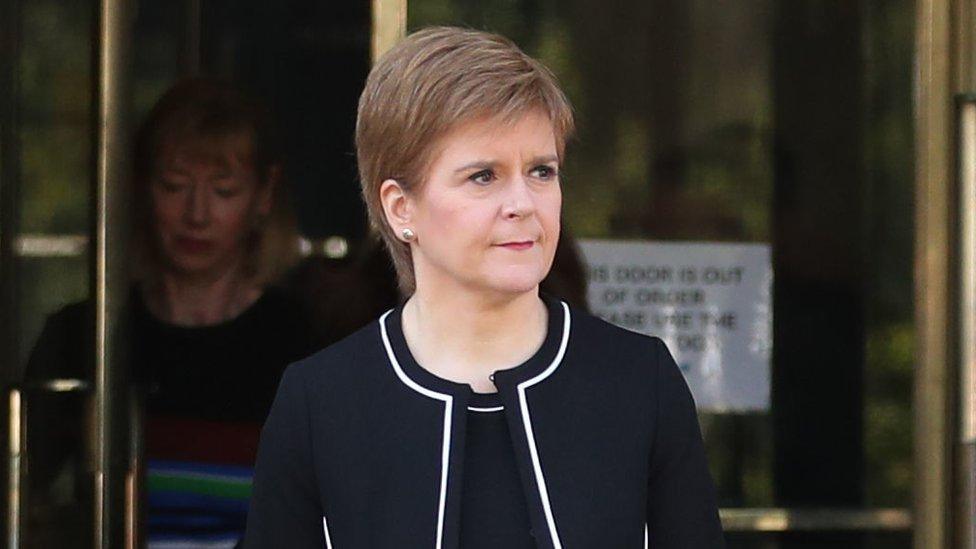'Damn your principles, stick to your party'
- Published

Prime Minister Boris Johnson and Douglas Ross visited a distillery in Moray during the 2019 general election campaign
Politicians occasionally struggle with principles.
Rigid adherence to one doctrine can preclude winning friends - that is, voters - from sectors which veer in alternative directions.
Sometimes, they resort to Disraeli's advice: "Damn your principles, stick to your party."
That is, they may substitute party loyalty for doctrinal purity. If they find they can no longer achieve such a feat, then they will, without exception, declare that it is the party which has changed. Not them.
Or they may adopt the Marxist approach. (Groucho, of course, not Karl.)
They will say: "These are my principles. If you don't like them, I have others."
To be fair, flexibility can be advantageous to the public interest. No manifesto can cover every eventuality which will arise during the term of a government.
Who, except in remarkable circumstances, can forecast a specific war or internal conflict? Who, bar a few scientists, spotted coronavirus on the horizon?

Former Scottish Conservatives leader Ruth Davidson will take up her seat in the House of Lords after her term at Holyrood ends
Politicians must adapt. To govern is to choose. When we pick politicians in our turn, at elections, we are frequently going by character and trust. We are opting for leaders upon whom we can rely to take generally sensible decisions.
But still principle intrudes, with good reason. There will be, from time to time, issues so over-riding that they generate rigidity. More precisely, they can come to define the nature of a political party or movement.
Such is the situation potentially confronting Scottish politics. Or, perhaps precisely, its two leading protagonists.
I talk of the principal party advocating independence, the Scottish National Party. And the principal party supporting the Union, the Conservatives.
For the new leader of the Scottish Tories, Douglas Ross, the Union is not just a policy on a slate. It is not just a clause in the party manifesto, accompanied by a cheery picture of a smiling child or animal, according to whim.
It is bidding fair to be the defining characteristic of the Tories' pitch to Scotland. Just as Ruth Davidson did, Mr Ross will seek to corral all the pro-Union voters into the Tory camp.

Mr Ross has officiated in Champions League matches - sometimes at the expense of voting in parliament
He will say to sundry folk. Ok, you may not like everything I stand for. Such unyielding adherence is seldom to be found.
But you back the Union, don't you? You loathe independence, don't you? You fear the SNP, don't you?
So, he'll argue, join me in a defence of said Union. Lend me your vote. Put the principle of Unionism first.
Mr Ross, however, is a mite more subtle than that. (You learn a few diplomatic tricks running the line in a Scottish football match - even now that the supportive comments from the adjacent crowd have been temporarily silenced.)
He knows that the next Holyrood elections - and ballots thereafter - will not be fought solely upon the issue of the Union. They will not be rerun referendums.
Douglas Ross, after all, will be seeking to replace Nicola Sturgeon as First Minister. It will be incumbent upon him to give us a clue as to what he might do, not least with the economy and taxation in future (eventually, one hopes) post Covid days.
Hence we can expect in the next few days, weeks and months an outpouring of policy and strategy from the Tories. Mr Ross is already promising an economic plan as his first endeavour.
But always there will be that offer of defending the Union - just as, with the SNP, there is the principle of independence.

First Minister Nicola Sturgeon has seen her approval ratings increase during the Covid-19 pandemic
As Nicola Sturgeon regularly says, when challenged, she never makes any secret of her support for an independent Scotland.
As she also says, though, it may not be necessary - or even helpful to her cause - to focus upon nothing else. Voters want variety.
So challenge one for Mr Ross will be to prove his mettle. He backs the Union. We get the concept. It is in his party's long title. What else has he got?
Then there will be another challenge, this one arising directly out of another principle. That of Brexit.
Mr Ross voted to Remain in the European Union. As, of course, did a majority of the people in Scotland.
But he has since declared that those days are over, that the outcome has been determined by the people of the United Kingdom.
His stance now, not inconsistently given his adherence to the Union, is to argue that Brexit must be completed in a fashion which benefits the entire population of these islands.
Now, I accept that this is a position, in itself, deriving more from pragmatism than principle. He is dealing with events as he finds them.
But Brexit is not seen in that light by a substantial segment of his party, perhaps the dominant segment, at least in England.
How to handle Brexit
For the vehement Brexiteers, departing the European Union is an article of faith. The article of faith. It defines their politics, in much the same way as the concept of independence shapes Nationalists.
Some in his party will be looking for a blended statement of principle. Pro Union. Pro Brexit. They will be alert for any departures from the true and just cause, as they see it.
More importantly, Mr Ross will have to defend both principles - in the light of developing events.
The Tories have an established armoury of weapons to deploy in support of the Union. We can expect them to be paraded once more. Successfully or otherwise, as the voters determine.
But how to handle Brexit - when the people of Scotland palpably voted against it?
More to the point, how to handle the implications of Brexit? Will there be a trade deal? What if that comes at the cost of concessions to European fishing fleets?
Douglas Ross will need dexterity and subtlety to deal with the practical consequences of political principle.
